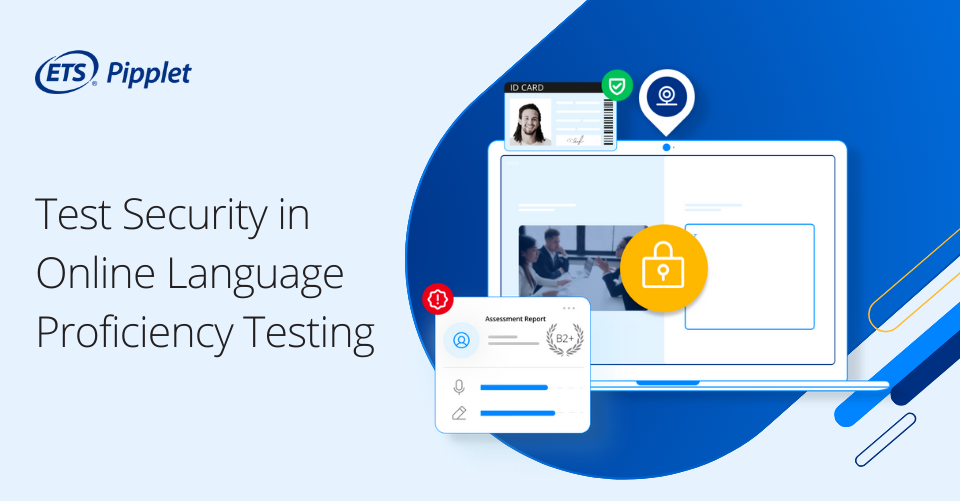Integrity in Remote Language Proficiency Tests: The Role of Online Proctoring
Success achieved through deceit is like a house built on sand. It will collapse under the weight of its own falsehood. This maxim couldn’t be truer in the age of digital learning and testing. Institutions and organizations must maintain their standard of excellence and integrity when measuring a person’s proficiency, whether in terms of language or technical skills. After all, in a skills- and merit-based economy, verifiable data such as examination results serve as a source of truth about a person’s capabilities.
The Importance of Integrity in Online Remote Assessments
Upholding the integrity of online assessments through remote proctoring is essential. At stake is the reputation of the institution and the test takers who – before entering a chosen program or profession – must prove their mettle and the veracity of their test results and credentials.
It’s no wonder that the concepts of
credentials and
credibility share a root word linked to believability and integrity. Building up your credentials through the rigors of online testing can lead to building up your credibility.
Moreover, dishonest behavior during online exams can have significant repercussions for test takers. For example, in a 2023 language proficiency test – required as part of university admission in some countries – cases of academic dishonesty have resulted in offers of placement being rescinded by higher education institutions.
The challenge, therefore, is to find newer and more reliable ways of protecting the integrity of online exams and maintaining people’s trust in the testing system.
Common Challenges of Remote Assessments Without Online Proctoring
Without a proper remote proctoring system in place, online assessments become prone to security violations. Below are a few hurdles that online test facilitators commonly face:
- Technical loopholes in the testing software or platform: Because of the limited features of some learning and testing platforms, they unknowingly open a gateway for participants to cheat. Some examples are lenient methods for logging into the testing portal, the lack of a screen or keyboard activity detector, and the unregulated use of a secondary gadget such as a mobile device.
- The lack of restrictions against accessing references: Digital cheat sheets are easily available to online test takers when taking an unproctored exam. Apart from online tools, however, students might also have access to unauthorized printed resources, such as textbooks and notes, in the absence of a test monitor or facilitator.
- Group cheating: In a traditional in-person set-up, test takers are instructed to put away their mobile devices to prevent communication with interlopers. Online testing, however, makes it easy for participants to communicate on secondary gadgets to discuss and share answers with their peers through email, calls, or instant messaging.
- Lack of identity verification: In the age of fingerprint scanning and facial recognition, cases of another person standing in for a test taker still happen at exams that skip the identity verification process.
The Benefits of Online Proctoring in Remote Assessments
Addressing the challenges above, online proctoring services generally offer benefits that significantly enhance the integrity and security of remote assessments:
- Advanced monitoring and security features: Most online proctoring services incorporate sophisticated software tools that closely monitor test-takers' activity. By implementing stringent login procedures and using verification methods such as biometric recognition or keystroke analysis, these services effectively close the technical loopholes that facilitate cheating. They can detect and prevent the use of unauthorized applications or browsers during the test, ensuring that the testing environment is secure and tamper-proof.
- Comprehensive restriction on unauthorized materials: Online proctoring services can restrict access to digital cheat sheets and other unauthorized resources. Proctors can monitor the test taker's environment through their webcam, ensuring that no textbooks, notes, or secondary devices are being used. This level of supervision deters students from accessing unauthorized materials, promoting a fair testing environment.
- Prevention of group cheating: With real-time monitoring capabilities, online proctoring services make it nearly impossible for students to communicate with peers for the purpose of cheating. Most software can detect unusual activity, such as the opening of chat applications, emails, or an unexpected presence in the room. Some services also include the ability to lock down the test taker's browser, preventing them from accessing communication tools or external websites.
- Robust identity verification: Leveraging the latest in facial recognition and fingerprint scanning technologies, online proctoring services ensure that the person registered for the test is the one actually taking it. These services conduct identity verification at multiple stages of the testing process, from the initial login to random checks during the exam. This significantly mitigates the risk of impersonation and upholds the validity of the assessment results.
Proctoring software in the market today offer different combinations of these common features and thus also offer varying levels of severity in identifying and controlling cheating and fraud. When choosing proctoring for online testing, organizations must choose the solution that fits their priorities for reliability and security, while considering the impact on the test-taker experience.
Inside Pipplet’s Language Proficiency Test with Online Proctoring

Pipplet’s online language proficiency testing software is reinforced with test security features, designed to prevent cheating and fraud in a remote, online test setting while maintaining a smooth and non-intrusive experience for the test taker. The advanced proctoring system presents several benefits for both test takers and test administrators:
1) Identity Verification
- Stripe Identity scans a valid ID and requires real-time selfies to unlock the test, ensuring the person taking the test is the registered candidate.
- Visual Monitoring takes photos of the test taker through their webcam at regular intervals throughout the test, ensuring the test conditions are respected. This process occurs seamlessly and quietly in the background, without interrupting the test taker.
2) Behavior Management
- Focus Track alerts and tracks when the candidate leaves the test window, ensuring they stay on task.
- Copy-Paste Protection disables and detects copy-paste attempts to ensure responses are original.
- Extension Protection blocks writing assistance extensions like Grammarly, maintaining the authenticity of the test-taker's knowledge.
- With Double Human Invigilation, human examiners flag unusual behaviors for further inspection by an internal review team. This human oversight also ensures that innocent actions by well-meaning test takers aren’t misinterpreted.
3) Contextualized Reporting
- The Unusual Behavior Notification system informs administrators of clear violations via email and dashboard, allowing for prompt action.
- With the Access to Responses feature, administrators can review all responses and snapshots, providing a comprehensive overview of the test-taking process.
These features collectively ensure that the online assessment is conducted fairly and with integrity, while also being non-intrusive and respectful of the candidate’s experience. Test administrators benefit from robust monitoring and reporting tools, and test takers are provided a fair testing environment where they can showcase their true capabilities without worry.
Conclusion
Overall, online proctoring not only deters cheating but also enhances the credibility of remote assessments.
By implementing robust proctoring solutions, such as those offered by Pipplet, institutions can safeguard the reliability of their assessments and ensure that academic achievements truly reflect an individual’s knowledge and skills.
Related stories









